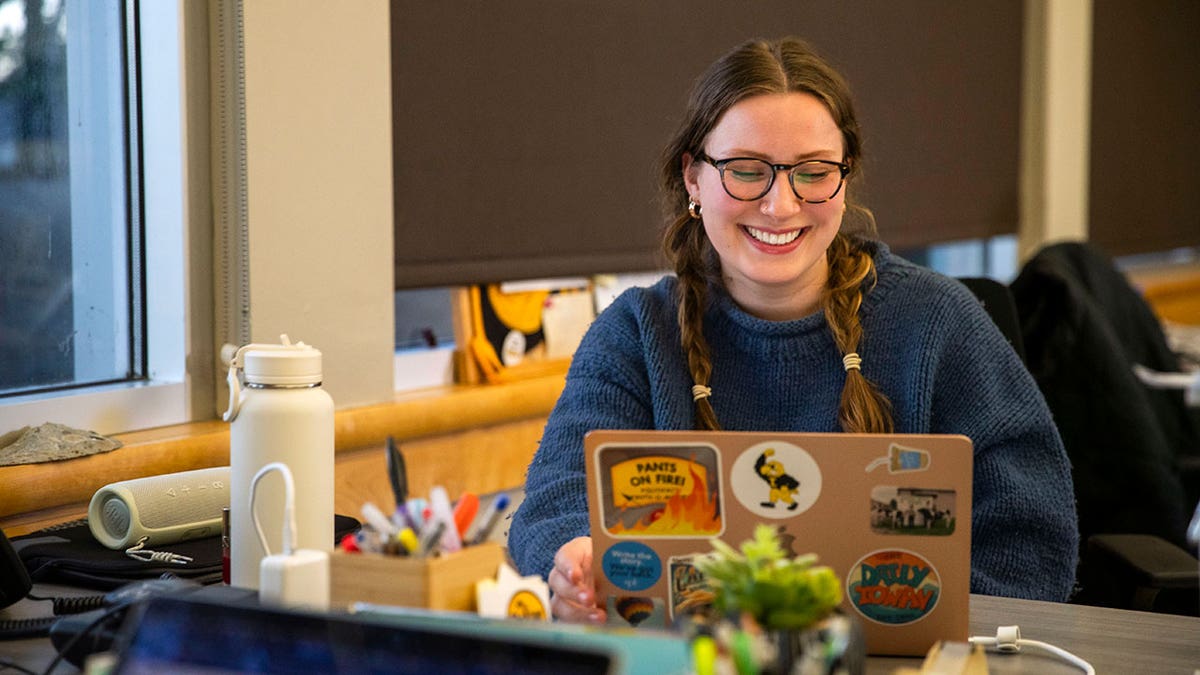Former Notre Dame newspaper editor gratified after legal victory
Former Irish Rover editor-in-chief W. Joseph DeReuil discusses the judge's ruling against a pro-choice professor who sued the student newspaper for defamation.
- The Daily Iowan, a student paper for the University of Iowa, has purchased two struggling publications in Iowa to address a lack of local news coverage.
- Students from The Daily Iowan will collaborate with the existing staff of the weeklies to cover small communities in Mount Vernon, Lisbon and Solon.
- The move is seen as a response to the decline of traditional media, which has lost significant advertising revenue to big tech and social media.
With hundreds of U.S. newspaper closings leaving legions with little access to local news, a college newspaper in Iowa has stepped up to buy two struggling weekly publications.
The move by The Daily Iowan, a nonprofit student paper for the University of Iowa, is believed to be a first, though other universities are stepping up to fill America's news void in different ways.
Students will work alongside the papers' existing one- or two-person reporting staffs and put themselves to work covering the small communities of Mount Vernon, Lisbon and Solon, Iowa. The weeklies' owner proposed the buyout to save the publications, which have a combined circulation of 1,900.
"It’s a really great way to help the problem of news deserts in rural areas," said Sabine Martin, executive editor of The Daily Iowan, who will copy edit stories for one of the papers. She already oversees editorial operations for a school paper whose most recent tax filings show had more than $2 million in net assets.

Executive Editor Sabine Martin works in The Daily Iowan newsroom on Feb. 29, 2024, in Iowa City, Iowa. With hundreds of U.S. newspaper closings leaving legions with little access to local news, a college newspaper in Iowa has stepped up to buy two struggling weekly publications. (Emily Nyberg/The Daily Iowan via AP)
Since 2005, the U.S. has lost about 70% of newsroom jobs and one-third of all newspapers, said Zach Metzger, director of the State of Local News Project at Northwestern University. He described the industry's downfall as a "cliff dive."
Traditional media has been in that dive since big tech and social media began siphoning off the monster share of advertising dollars.
Richard Watts, director for the Center for Community News at the University of Vermont, said his group has identified 120 university-led student reporting programs that provide local news.
MULTIPLE NORTH DAKOTA NEWSPAPERS CEASE PUBLICATION FOLLOWING CLOSURE OF CENTURY-OLD FAMILY BUSINESS
A handful of college publications had already been heavily invested in local news, including the University of Missouri, where professional editors supervise journalism students who have produced a community newspaper for decades.
"There’s lots of examples of programs stepping in because the local media ecosystem doesn’t exist in the way it once did," said Watts, whose school oversees a service that provides student stories to professional news outlets.
It's a microcosm of industry experimentation, said Barbara Allen, director of college programming at the Poynter Institute, a journalism think tank.
"I don’t think anybody out there is bold enough yet to say, you know, this is the magic bullet," she said. "We now believe in a magic shotgun ... it’s going to take hundreds of pellets."
Each college newspaper attack on news deserts — wide swaths of U.S. communities with no dedicated source of local news — looks different. Some report on state legislatures and distribute the stories statewide. Others produce stories for Spanish-language publications or expand their coverage beyond campus events so they can circulate their papers throughout the community, Watts said.
The man behind selling the two Iowa papers is Bob Woodward, no relation to the Watergate scandal reporter. His family's business, Woodward Communications, was trying to figure out what to do with two properties that "weren’t performing very well."
Woodward knew that journalism students at the University of Kansas run an online news site for a nearby community that lost its newspaper. He also knew that the University of Georgia's Grady College of Journalism and Mass Communication saved a 148-year-old weekly, The Oglethorpe Echo, in 2021 by taking it over and turning it into a nonprofit that students write stories for. The deal went through virtually for free, distinguishing it from The Daily Iowan transaction.
And then there is the University of Oregon, where students stepped up to help the Eugene Weekly after it fell victim to an embezzlement scheme in late 2023 that forced layoffs. The students even helped break a story that led to the local school superintendent being outsted, said Peter Laufer, chair of the university’s journalism school.
With these stories in mind, Woodward approached The Daily Iowan’s publisher, Jason Brummond, and asked if it would be interested in a deal.
"We don’t like being in the business of closing newspapers, frankly, or even selling them, but we just felt like they probably deserved a better home," said Woodward, who stepped down as vice president of the news business earlier this year to oversee fundraising to pay reporters.
Brummond took the proposal to Student Publications Inc., the non-profit that manages The Daily Iowan, and its board approved it unanimously. (The board’s chair, Ryan J. Foley, is an AP correspondent in Iowa City who graduated from the university in 2003.)
The deal was finalized in February, with the nonprofit that runs The Daily Iowan taking over the Mount Vernon-Lisbon Sun and the Solon Economist.
Neither Woodward nor Brummond disclosed the sale price, though Woodward described it as "a fairly nominal amount." Brummond said Student Publications may ultimately be required to disclose the amount as part of a tax filing.
CLICK HERE TO GET THE FOX NEWS APP
Interviews will start soon for interns for the two Iowa papers, said Brummond, who also is serving as publisher of the two weeklies. So far the work has been mainly behind the scenes, absorbing the papers' half dozen part- and full-time reporters and ad employees and redesigning the publications' print and online editions.
By fall, university reporting classes will assign stories on the two communities and the editors will decide whether to use them. Ultimately, non-journalism majors might be enlisted to help with the business side of operations.
"Our hope for this is that these are sustainable models that are producing really good journalism," Brummond said.
Nathan Countryman, the editor at the Mount Vernon-Lisbon Sun, is eager for the help covering meetings, graduation and beloved community events like Sauerkraut Days. More importantly, though, the deal means the paper won't close.
"We know what that means for our community," he said.










































